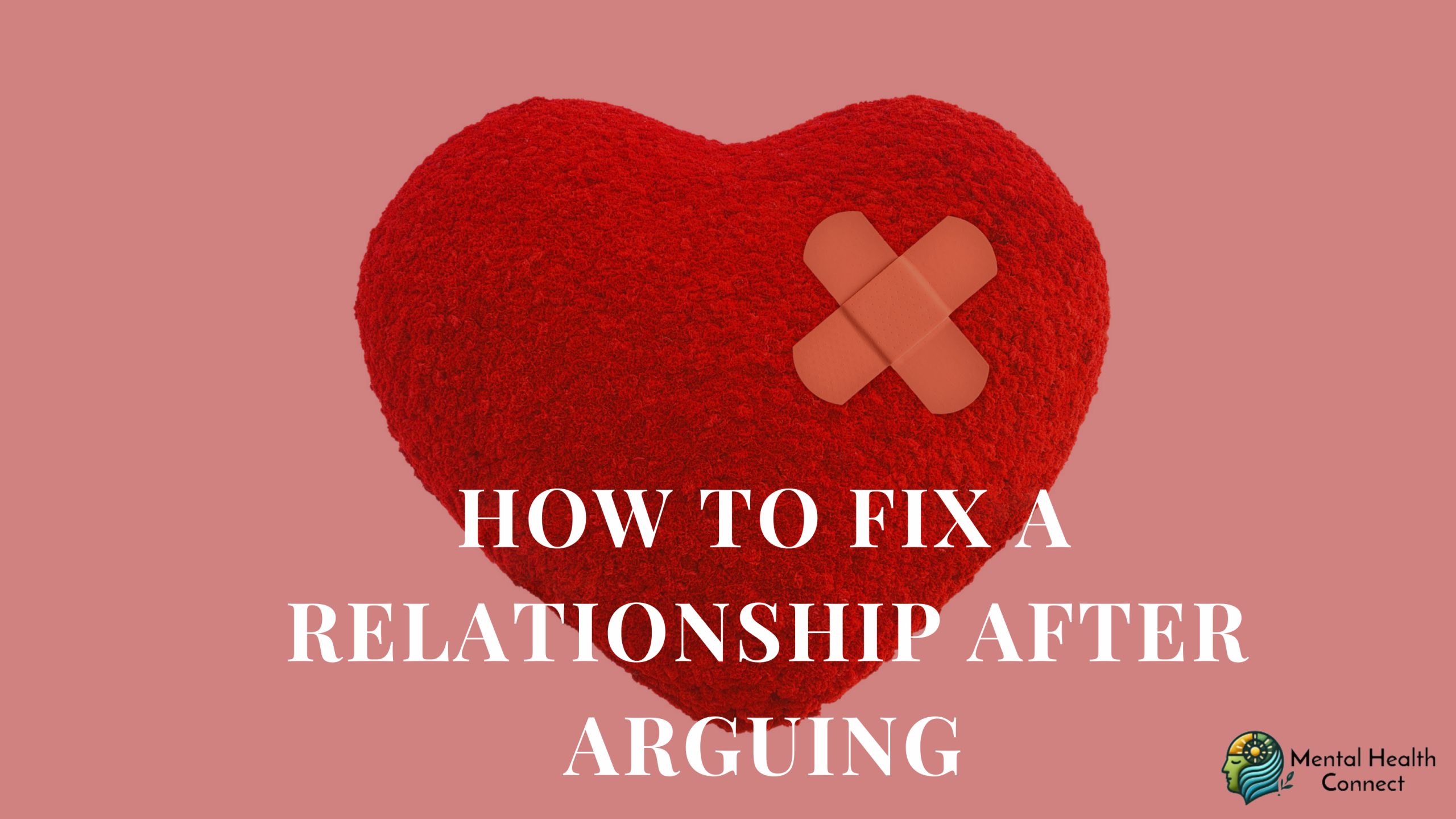Mending the Bond: How to Fix a Relationship After Arguing

Conflict is inevitable in any intimate partnership, and understanding effective ways to fix a relationship after arguing is vital for nurturing lasting connections. When disagreements escalate and emotions run high, the subsequent strain can create significant distance between partners. The journey of fixing a relationship after arguing demands patience, sincere communication, and dedicated effort from both individuals involved. In the wake of heated exchanges, couples often experience lingering hurt and disconnection, yet with thoughtful strategies, these difficult moments can be transformed into foundations for deeper understanding and stronger bonds. This comprehensive guide offers practical approaches to navigate the sensitive process of relationship healing after conflicts and restore the trust and intimacy that may have been compromised during disagreements.
The Essence of Post-Conflict Relationship Healing Post-conflict relationship healing refers to the conscious steps partners take to restore connection and reestablish harmony after experiencing disagreements. Unlike simply moving past the argument without acknowledgment, genuine healing addresses both the emotional wounds inflicted and the core issues that sparked the disagreement.
Meaningful relationship healing after arguing typically encompasses several fundamental components:
Feeling recognition: Identifying and acknowledging emotions experienced on both sides

Personal ownership: Accepting responsibility for one’s contributions to the conflict Heartfelt expressions of regret: Conveying sincere apologies that demonstrate understanding of impact
Concrete behavioral shifts: Implementing specific adjustments to prevent similar conflicts
Emotional restoration: Participating in experiences that rebuild safety and connection

To illustrate, authentic healing might involve expressing: “I realize that when I dismissed your financial concerns during our conversation, you felt devalued and anxious. I sincerely regret my dismissive response, and moving forward, I commit to giving full consideration to your perspective when discussing matters that affect us both.”
Why Fixing Your Relationship After Arguments Is Critical Learning how to fix a relationship after arguing is essential for partnership longevity and mutual fulfillment for several compelling reasons:
Prevents Lasting Emotional Division Unresolved disputes create subtle but significant barriers between partners. Each conflict left unaddressed contributes to accumulated resentment that, over time, can evolve into profound emotional separation. Effective healing prevents this division from becoming permanent.
Builds Relationship Endurance Partnerships that successfully recover from arguments develop heightened resilience. Each constructively resolved conflict strengthens the relationship’s capacity to withstand future challenges and bolsters partners’ faith in their collective ability to overcome difficulties.
Cultivates Deeper Partner Insights The healing journey often uncovers valuable understanding about each partner’s triggers, communication styles, and emotional requirements. This knowledge enhances partners’ capacity to support each other appropriately and minimize future conflicts.
Fosters Constructive Interaction Patterns Consistent, effective conflict resolution creates relationship dynamics where both individuals feel secure expressing concerns, understanding that disagreements will ultimately reinforce rather than undermine their bond.
Strengthens Emotional Intimacy Vulnerability during the healing process—acknowledging missteps, expressing hurt, extending forgiveness—creates pathways for profound emotional connection that might otherwise remain unexplored.
A Comprehensive Approach to Fixing a Relationship After Arguing
1. Embrace Emotional Settling Time Before initiating reconciliation: – Allow adequate time for emotional equilibrium to return (typically 40-75 minutes minimum) – Practice individual calming techniques such as mindful breathing or brief solitary walks – Delay significant relationship discussions until heightened emotions have subsided
2. Begin the Healing Conversation When emotional readiness exists for both partners: – Select a neutral, comfortable environment free from distractions – Open with a connection-oriented statement: “I value what we share together, and I want us to find our way through this challenge” – Remain mindful of vocal tone, facial expressions, and physical posture – Set conversation parameters such as full attention when speaking and avoiding accusatory language
3. Engage in Receptive Listening – Provide undistracted attention when your partner communicates – Demonstrate comprehension with reflection statements: “If I understand correctly, you felt…” – Pose thoughtful questions to enhance understanding – Acknowledge the legitimacy of their emotional experience regardless of perspective differences
4. Acknowledge Your Contributions – Direct focus toward examining your actions rather than emphasizing your partner’s – Frame communication with ownership language: “My actions contributed to our disagreement when I…” – Resist qualifying your responsibility with explanations – Identify specific behaviors and their resulting impacts clearly
5. Deliver a Meaningful Apology An effective apology encompasses: – Clear acknowledgment of the specific hurtful behavior – Demonstrated insight into its emotional impact – Expression of genuine remorse – Specific commitment to behavioral adjustment
6. Develop Collaborative Solutions – Address concerns individually rather than attempting comprehensive resolution simultaneously – Jointly explore potential approaches – Demonstrate willingness for mutual accommodation – Establish clearly defined, implementable agreements
7. Restore Emotional Connection – Share in activities that bring mutual enjoyment – Express appreciation for your partner’s healing efforts – Engage in appropriate physical connection – Verbally reaffirm your commitment to relationship growth
Proven Strategies for Fixing a Relationship After Arguing
Honor Appropriate Timing Attempting reconciliation prematurely often intensifies tension. Research indicates that physiological arousal significantly impairs communication effectiveness—when heart rates exceed approximately 95-100 beats per minute during conflict, capacity for rational processing and empathetic response diminishes substantially.
Emphasize Understanding Before Resolution Many couples hasten toward problem-solving before establishing shared comprehension. Dedicate approximately 65-75% of your healing conversation to achieving mutual understanding before transitioning to solution development.
Create Reconciliation Signals Establish meaningful reconciliation indicators that both partners recognize. This might include a distinctive phrase, gentle gesture, or specific shared ritual that signals openness to reconnection.
Acknowledge Reconciliation Attempts In thriving relationships, partners regularly extend “connection invitations” following conflict. Respond positively to your partner’s reconciliation attempts, even subtle ones like casual questions or seeking proximity. Maintain Constructive Perspective Remember that relationship research suggests approximately 65-70% of relationship conflicts involve perpetual issues that require ongoing management rather than permanent resolution. Success involves learning to discuss differences constructively rather than eliminating them entirely.
Common Missteps When Fixing a Relationship After Arguing
Misstep 1: Perfunctory Apologies
Problem: Offering cursory apologies to expedite conflict conclusion without genuine understanding or remorse.
Solution: Postpone apology expression until you can authentically identify your impact and feel genuine regret for your contribution.
Misstep 2: Conflict Cataloging
Problem: Introducing previous disagreements or tracking apology frequency during current healing efforts.
Solution: Maintain focus exclusively on addressing the immediate conflict without reference to past disputes.
Misstep 3: Anticipatory Response
Problem: Mentally formulating counterarguments rather than fully absorbing your partner’s perspective.
Solution: Consider brief mental noting of thoughts to address later, allowing complete attentional focus on understanding your partner’s communication.
Misstep 4: Generalized Commitments
Problem: Making broad improvement promises lacking specificity or measurability.
Solution: Establish precise, observable behavioral commitments: “When I feel overwhelmed during important discussions, I’ll request a brief pause to collect my thoughts rather than withdrawing completely.”
Misstep 5: Bypassing Reconnection
Problem: Assuming relationship normalcy automatically resumes following conflict discussion.
Solution: Deliberately create positive interaction experiences following healing conversations to rebuild emotional safety and connection.
Emerging Developments in Relationship Conflict Resolution
Digital Reconciliation Tools
Relationship applications providing conflict pattern recognition, timely reconciliation guidance, and personalized resolution strategies are becoming increasingly sophisticated and accessible to partners seeking additional support.
Emotional Intelligence Enhancement
Contemporary relationship education increasingly focuses on developing emotional regulation capabilities and empathetic understanding as foundational reconciliation skills rather than emphasizing communication techniques exclusively.
Mindfulness Application
Mindfulness practices are increasingly integrated into relationship healing frameworks, helping partners respond thoughtfully rather than reactively during conflict resolution processes.
Preventative Relationship Maintenance
The field increasingly emphasizes identifying potential conflicts through regular relationship check-ins and maintenance conversations before significant escalation occurs.
Frequently Asked Questions About Fixing a Relationship After Arguing
What is the ideal waiting period before attempting to fix the relationship after an intense argument?
Research suggests waiting until physiological arousal returns to baseline levels—typically minimum 40-75 minutes. For particularly intense conflicts, establishing a specific future time to revisit the discussion after a longer cooling period often proves beneficial.
How should I approach a partner who needs extended distance following arguments?
Respect their processing requirements while clearly expressing your readiness to reconnect when they feel prepared. A balanced approach might include: “I understand your need for reflection time. I’ll be available whenever you’re ready to talk.” If withdrawal becomes a persistent pattern, consider suggesting professional relationship guidance.
Should I be concerned if we argue about identical issues repeatedly?
Not necessarily. Research demonstrates that approximately 65-70% of relationship conflicts involve perpetual issues revisited throughout the relationship lifespan. Success involves improving how these discussions unfold rather than eliminating the differences themselves.
What distinguishes healthy argument patterns from problematic conflict dynamics?
Healthy conflict involves maintaining respect despite disagreement, demonstrating reconciliation willingness, and achieving eventual resolution. Warning indicators include contemptuous behaviors (mocking, eye-rolling), stonewalling patterns, character-targeted criticism rather than behavior-specific feedback, and persistent defensiveness.
Is resolving all aspects of an argument before sleeping necessary for relationship health?
While conventional wisdom suggests avoiding unresolved conflict overnight, sleep sometimes enhances perspective and emotional regulation capacity. Consider briefly acknowledging the issue and establishing a specific time for continued discussion rather than forcing immediate resolution or ignoring tension entirely.
What approaches help prevent minor disagreements from escalating into significant arguments?
Develop early intervention awareness by identifying your typical escalation patterns. Establish a mutually respected pause signal, employ appropriate tension-reducing humor, and regularly practice appreciation to strengthen emotional reserves between conflicts.
What role should forgiveness play when fixing a relationship after arguing?

Forgiveness represents an essential healing component but requires appropriate timing. Authentic forgiveness involves acknowledging hurt experienced, consciously releasing resentment, and rebuilding trust through consistent behavioral change—a process requiring time rather than immediate declaration.
Developing effective approaches for fixing a relationship after arguing is an invaluable skill that strengthens with consistent practice and intention. Relationship resilience isn’t measured by conflict absence but by partners’ capacity to restore connection afterward. By allowing appropriate emotional processing time, engaging in honest yet compassionate communication, accepting responsibility for your conflict contributions, and intentionally rebuilding emotional intimacy, you transform arguments from relationship threats into opportunities for deeper understanding and connection. Remember that relationship healing represents an ongoing growth process rather than a singular event. By implementing these healing strategies following your next disagreement, you’ll observe how your relationship progressively strengthens through constructively navigated conflict.
-
 How to Support Someone with OCDApril 17, 2025
How to Support Someone with OCDApril 17, 2025 -


Leave a Reply